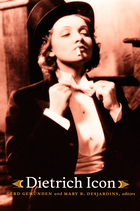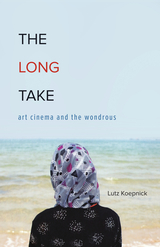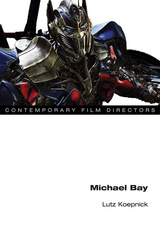
Some of the essays in this collection revisit such familiar topics as Germany’s complex relationship with Dietrich, her ambiguous sexuality, her place in the lesbian archive, her star status, and her legendary legs, but with fresh critical perspective and an emphasis on historical background. Other essays establish new avenues for understanding Dietrich’s persona. Among these are a reading of Marlene Dietrich’s ABC—an eclectic autobiographical compendium containing Dietrich’s thoughts on such diverse subjects as “steak,” “Sternberg (Joseph von),” “Stravinsky,” and “stupidity”—and an argument that Dietrich manipulated her voice—through her accent, sexual innuendo, and singing—as much as her visual image in order to convey a cosmopolitan world-weariness. Still other essays consider the specter of aging that loomed over Dietrich’s career, as well as the many imitations of the Dietrich persona that have emerged since the star’s death in 1992.
Contributors. Nora M. Alter, Steven Bach, Elisabeth Bronfen, Erica Carter, Mary R. Desjardins, Joseph Garncarz, Gerd Gemünden, Mary Beth Haralovich, Amelie Hastie, Lutz Koepnick, Alice A. Kuzniar, Amy Lawrence, Judith Mayne, Patrice Petro, Eric Rentschler, Gaylyn Studlar, Werner Sudendorf, Mark Williams

In The Long Take, Lutz Koepnick posits extended shot durations as a powerful medium for exploring different modes of perception and attention in our fast-paced world of mediated stimulations. Grounding his inquiry in the long takes of international filmmakers such as Béla Tarr, Tsai Ming-liang, Abbas Kiarostami, Apichatpong Weerasethakul, and Michael Haneke, Koepnick reveals how their films evoke wondrous experiences of surprise, disruption, enchantment, and reorientation. He proceeds to show how the long take has come to thrive in diverse artistic practices across different media platforms: from the work of photographer Hiroshi Sugimoto to the screen-based installations of Sophie Calle and Tacita Dean, from experimental work by Francis Alÿs and Janet Cardiff to durational images in contemporary video games.
Deeply informed by film and media theory, yet written in a fluid and often poetic style, The Long Take goes far beyond recent writing about slow cinema. In Koepnick’s account, the long take serves as a critical hallmark of international art cinema in the twenty-first century. It invites viewers to probe the aesthetics of moving images and to recalibrate their sense of time. Long takes unlock windows toward the new and unexpected amid the ever-mounting pressures of 24/7 self-management.

READERS
Browse our collection.
PUBLISHERS
See BiblioVault's publisher services.
STUDENT SERVICES
Files for college accessibility offices.
UChicago Accessibility Resources
home | accessibility | search | about | contact us
BiblioVault ® 2001 - 2024
The University of Chicago Press









